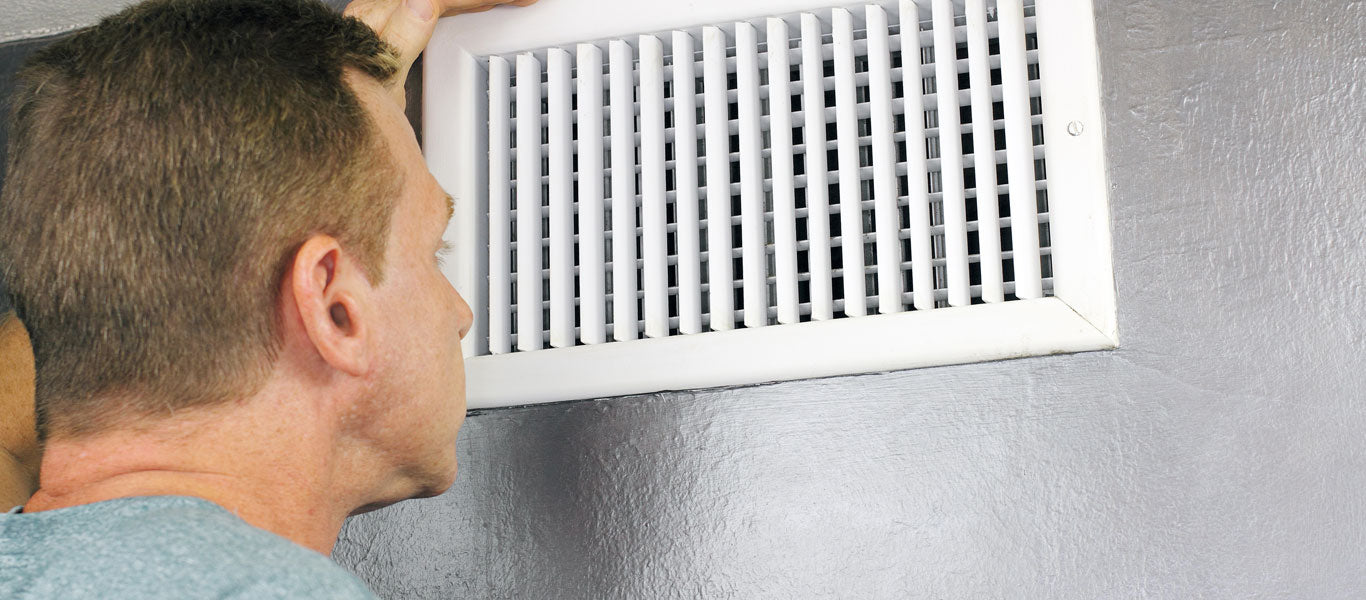A musty smell from air conditioning is a common complaint, but it’s not normal for air-conditioned air to smell musty; air-conditioned air shouldn’t smell at all. Strange smells from your air conditioner indicate underlying issues.
Musty smells are typically caused by excessive moisture within the HVAC system, resulting in bacteria, mold, and mildew growth. It’s essential to determine the source of this extra moisture since bacteria and mold spores can spread in the air throughout the house and cause health issues and trigger allergies. Fortunately, musty and other unpleasant odors can often be easily resolved.
Why Your Air Conditioner Smells Musty
If your air conditioner smells musty, the cause might be a dirty air filter, clogged drain line, full drain pan, frozen evaporator coils, or excessive moisture in the ducts and vents. You can easily determine if any of these issues is the source of the odor.
1. Dirty Air Filters
HVAC systems have air filters that collect dust, dirt, hair, and debris from your home’s air. Air filters keep the HVAC system clean and improve the quality of the air you breathe. Air filters need to be changed regularly to keep the system functioning correctly and the air fresh. How often to change the air filter depends on the filter’s quality. Filters should generally be changed every month to three months.
When filters are not regularly changed, dust, dirt, and debris accumulate and restrict airflow through the HVAC system. Restricted airflow reduces moisture evaporation. The air filter and other components remain damp, and mold and mildew begin to grow on them. Air passing over the mold and mildew spreads a musty odor throughout the house.

Discover Top-Grade Air Conditioners: View Our Products Today
2. Clogged Drain Lines
The drain line, also known as the condensate line, is typically a PVC pipe that drains water from the indoor unit’s drain pan to the landscaping or a storm drain outside the house. The exterior section of the drain line is a small, sometimes capped, pipe located next to the condenser.
Drain lines can become clogged with sludge and debris and block water outflow. Mold and mildew grow in moist conditions and cause musty odors.
3. Full Drain Pan
The drain pan, also known as the condensate pan, collects condensation droplets that form on the evaporator coils located in the indoor unit. The drain pan’s accumulated moisture empties into the drain line and is carried away from the unit.
Drain pans can rust and become clogged with hair and other debris that restrict drainage. Moisture accumulates in the pan, and mold grows and emits an odor.
4. Frozen Evaporator Coils
The evaporator coils are located in or near the indoor air handler unit, positioned by the blower fan. Refrigerant runs through the evaporator coils to remove heat and humidity from the home’s air, and condensation forms on the coils. Normally, the condensation droplets evaporate or drip off the coils into the drain pan.
If airflow through the HVAC system is restricted by a dirty air filter or the evaporator coils are especially dirty, the condensation droplets freeze on the coils. If your AC is freezing up, the droplets can thaw between cooling cycles and remain damp. Mold can begin to grow on the constantly moist coils.
5. Excessive Moisture in Ducts and Vents
Drainage leaks and holes in the air ducts and vents allow moisture from humidity to enter. The dark, damp environment inside the ductwork is ideal for mold growth.

Discover Top-Grade Air Conditioners: View Our Products Today
How to Stop Musty Smell from Air Conditioner
Homeowners can eliminate musty air conditioner smells by changing the air filter and cleaning the evaporator coils, ducts, vents, and condensate lines. Regular HVAC maintenance is another critical component of preventing and eliminating air conditioner odors.
Other Common Air Conditioner Smells
Air conditioners emit various smells that correlate to HVAC issues. If your AC smells like vinegar, it could be another sign of mold and bacteria growth due to a dirty air filter, clogged drain line, full drain pan, frozen evaporator coils, or excessive moisture in the ducts and vents. It might also be the odor of ozone from a failing electric motor.
A burning smell from the AC could indicate an overheating motor due to a dirty air filter or worn-out bearings. A burnt odor can also point to a damaged capacitor and other electrical issues. Turn off your air conditioner, and call a professional to inspect your system.
A fishy smell from the air conditioner is a serious indication of an electrical issue that could spark a fire. When heated or burnt, the plastic coating on electrical wires emits a fishy odor. The source of the electrical problem might be within the HVAC system, or the scent of a nearby electrical issue might be sucked into the system’s intake and spread throughout the house. Shutting off the power and calling a professional electrician or HVAC technician is recommended.

Discover Top-Grade Air Conditioners: View Our Products Today
Conclusion
Musty air conditioner odors are typically caused by moisture issues that lead to mold and mildew growth. You might be able to resolve your air conditioner issue without calling an HVAC technician. Start by changing the air filter. If the problem persists, investigate the drain line, drain pan, and evaporator coils. Cleaning these components is not overly complicated and can be done by DIYers. However, if mold grows inside the ductwork, it should be cleaned by professionals to prevent a recurrence.
Future air conditioner issues can be prevented by scheduling yearly maintenance calls with a local HVAC company.








1 comment
J. Hobbs
I need to replace both my ceiling enclosure door and the metal filter holder. I would like to attach a photo, however, there doesn’t seem to be a way. Please advise.
760-333-5948
Thank you.